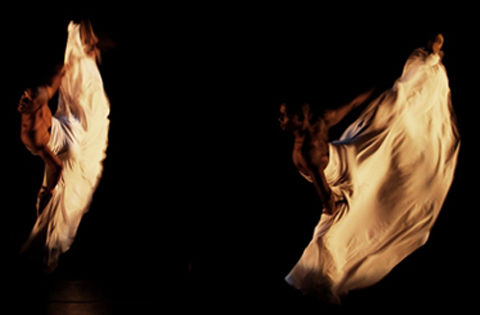Programs > Programs in the College of Performing Arts
Contacts Description Program Objectives Program Requirements

Quick Links
College of Performing Arts
School of Dance
Liberal Arts Distribution
Contacts
Donna Faye Burchfield / dburchfield@uarts.edu / 215.717.6580
Director, School of Dance
Description
The Dance curriculum is designed to balance a great range of experiences with small learning communities. It is divided into two parts: Foundation Series (freshman and sophomore years) and Portfolio & Research Series (junior and senior).
Studio Practice
All studio practice courses provide anatomically sound models for technical training in dance that consistently weave and reference both the historical and the emerging techniques, forms and styles through informed somatic practices.
Body Pathways
In Body Pathways, the dancer engages in conditioning and assessment, awareness for alignment, body placement and strength, experiential anatomy and varying somatic practices for sustaining the body in dance.
Thinking, Making, Doing (TMD)
Studio Practice, Body Pathway and Thinking Making Doing courses weave together to form the educational spine of the major. Tending to the need for dancers to be able to not only express themselves physically but also to nurture and to develop their artistry as creative and imaginative selves, TMD courses focus on honing the thinking and making aspects of a young artist.
Pedagogies of Performance in Dance (PODs)
Pedagogies of Performance in Dance courses offer students the opportunity to make connections through multiple access points. An interdisciplinary system, PODs are designed to help students recognize the tools and methodologies used in their own creative and performance work. PODs, and their extended labs, are taught by dance department faculty, faculty from other departments, as well as working professionals outside the University, all of whom bring a level of expertise to their individual topic.
Three credits may be taken in approved courses outside of the School of Dance (i.e. Collaboration Studio)
Capstone Courses
Sophomore Performance & Coaching Project, Senior Project & Critique, Senior Seminar
The capstones courses give students the opportunity to demonstrate their abilities to apply what they have learned. Through varied points of access within the curriculum, there is an emphasis on defining and articulating personal aesthetics across disciplines, articulating opinions & reflecting an ongoing, critical development within their creative practice(s). The Sophomore Performance & Coaching project culminates the Foundation Series. The Senior Project and Critique and Senior Seminar capstone courses are designed to be the culmination of the Portfolio & Research Series for dance majors.
Program Objectives
The faculty of the School of Dance have developed five essential learning goals that help to shape the school’s curriculum and the young dance artist and professional.
- Mutuality: Students will activate relationships in dance on personal, collective, regional and global levels.
- Relationship: Students will engage with the art world through multiple lenses of collaboration, exchange and difference.
- Expressivity: Students will develop tools and ideas of expression to speak, write, and dance about/with/of/alongside.
- Sustainability: Students will be immersed in anatomically sound technical training that consistently weaves and references both historical and emerging techniques, forms and styles through informed somatic practices.
- Resourcefulness: Students will develop and sharpen skills of reciprocity, relationship and network building through consistent contact with professional artists in the expanded field both within their communities and in the world.
These learning goals are mapped across courses that fall into six different categories: 1) Studio Practice, 2) Body Pathways, 3) Thinking, Making, Doing, 4) History, Theory and Criticism, 5) Capstone Experiences (Sophomore and Senior Projects), and 6) PODS (Pedagogies of Dance).
Program Requirements (129.5 credits)